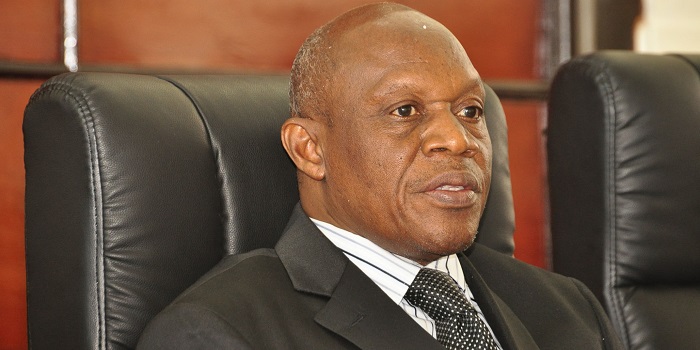I extend my profound regards to you, Justice (Rtd.) William Atuguba, former Judge of the Supreme Court of the Republic of Ghana. I commend you for your service to your beloved country. I write in relation to the recent standoff between the legislature and the judiciary of Ghana. After the Speaker of Parliament’s attention was drawn to the actions of the four Members of Parliament (MPs) namely;
- Andrew Asiamah - MP, Fomena (Independent to NPP)
- Cynthia Morrison - MP, Agona West (NPP to Independent)
- Kojo Asante - MP, Suhum (NPP to Independent)
- Peter Kwakye Ackah - MP, Amenfi Central (NDC to Independent)
He gave effect to the constitutional provision that their actions had invoked. These aforementioned MPs have filed their candidacy to run in the upcoming 2024 general elections. The reason for the three who are running as independent candidates is obviously borne out of animosity with their estranged political parties. The notice of polls released by the Electoral Commission (EC), the authorised body in charge of elections in Ghana indicate a switch in tickets. Article 97(1) (g) and (h) address this instance. It reads,
(g) – “A member of Parliament shall vacate his (their) seat in Parliament - if he (they) leave(s) the party of which he (they) was (were) a member at the time of his (their) election to Parliament to join another party or seeks to remain in Parliament as an independent member; or
(h) – if he (they) was (were) elected a member of Parliament as an independent candidate and join(s) a political party.” [pronoun and verb revision mine]
Your Lordship, you were interviewed on the matter on the 12th of November, 2024 by JoyNews. In your submission, you emphatically stated that the matter should have been directed to the High Court and not the Supreme Court as indicated under article 99(1) of the Constitution, 1992. You further stated that the Supreme Court only has referential jurisdiction. This means, in the event that the High Court deems a constitutional provision worthy of interpretation as a result of ambiguity or any mischief it may serve, then the matter in respect of the interpretation only will be referred to the Supreme Court. After which the interpretation will be used to reach a verdict at the High Court. When asked what you would have done when the suit was filed, you responded that you will have directed the plaintiffs to the High Court. However, if the provision is drafted in clear language devoid of any ambiguity or mischief, then there will be no reason for a Supreme Court interpretation. It is my conviction that you agree that the wording used by the drafters of Article 97(1)(g) and (h) is clear, likewise is 99(1).
Your Lordship, you had premised your submission by explaining that the Constitution provides specific guidelines regarding judicial authority over parliamentary vacancies. Citing Article 130 clauses 1 and 2, you categorically stated the legal principle verba generalia specialibus non derogant, meaning that general provisions should not override specific ones.
Accordingly, Article 130 offers general provisions, but the Constitution explicitly designates the High Court to handle matters regarding vacant seats in Parliament under Article 99(1).
That established, the Supreme Court flagrantly disregarded the very Constitution which bars them from interfering in the matter of parliamentary vacancy. They proceeded to rule on a matter that they did not have original jurisdiction whatsoever. This was not only a violation of the Constitution but also an affront to the separation of powers which propels the rule of law.
Your Lordship, you have stated after the ruling that the Speaker of Parliament must respect the decision of the Supreme Court and that he risks a ten-year jail term if he disregards it. This is in reference to Article 2(5) of the Constitution, 1992 whish states that, “A person convicted of a high crime under clause (4) of this article shall
- be liable to imprisonment not exceeding ten years without the option of a fine; and
- not be eligible for election, or for appointment, to any public office for ten years beginning with the date of the expiration of the term of imprisonment.
The law prevents anyone from benefiting from an offence as espoused in the Latin maxim, ‘ex turpi causa non oritur actio’. Kindly, assist me to comprehend what punishment is to be meted out to the Justices of the Supreme Court whose actions have been in clear encroachment, contravention and violation of the Constitution?
Yours faithfully
NANA FREDUA-AGYEMAN JNR.
Citizen, Republic of Ghana
Latest Stories
-
‘I didn’t come here for fun’ – Afrikaner defends refugee status in US
51 minutes -
Leading crypto firm Coinbase faces up to $400m hit from cyber attack
1 hour -
13 injured as car crashes into crowd at Espanyol-Barcelona match
1 hour -
South Africa’s president to visit US next week to meet Trump
1 hour -
Nigeria talks with Petrobras on deep water acreage, minister says
2 hours -
Judge to hear Mali’s request to reopen Barrick mine under new management, official says
2 hours -
Gabon transfers wife and son of former President Bongo to house arrest
2 hours -
Tanzania arrests opposition official travelling to political conference
2 hours -
Mali’s military rulers formally dissolve political parties
2 hours -
France expels Algerian officials in tit-for-tat measure, minister says ties ‘totally blocked’
3 hours -
Al Qaeda affiliate claims responsibility for Burkina attack, says it killed 60 soldiers
3 hours -
Chris Brown charged over alleged London nightclub assault
3 hours -
Decades-long mystery of ginger cats revealed
4 hours -
Walmart says higher prices could hit this month due to tariffs
4 hours -
India disputes Trump claim it is ready to charge US ‘no tariffs’
5 hours

